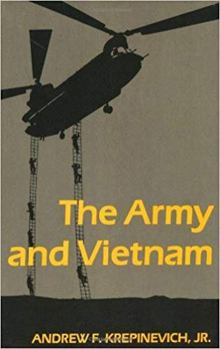The Army and Vietnam
Select Format
Select Condition 
Book Overview
Many senior army officials still claim that if they had been given enough soldiers and weapons, the United States could have won the war in Vietnam. In this probing analysis of U.S. military policy in Vietnam, career army officer and strategist Andrew F. Krepinevich, Jr., argues that precisely because of this mindset the war was lost before it was fought.
The army assumed that it could transplant to Indochina the operational methods that had been successful in the European battle theaters of World War II, an approach that proved ill-suited to the way the Vietnamese Communist forces fought. Theirs was a war of insurgency, and counterinsurgency, Krepinevich contends, requires light infantry formations, firepower restraint, and the resolution of political and social problems within the nation. To the very end, top military commanders refused to recognize this.
Krepinevich documents the deep division not only between the American military and civilian leaders over the very nature of the war, but also within the U.S. Army itself. Through extensive research in declassified material and interviews with officers and men with battlefield experience, he shows that those engaged in the combat understood early on that they were involved in a different kind of conflict. Their reports and urgings were discounted by the generals, who pressed on with a conventional war that brought devastation but little success.
A thorough analysis of the U.S. Army's role in the Vietnam War, The Army and Vietnam demonstrates with chilling persuasiveness the ways in which the army was unprepared to fight--lessons applicable to today's wars in Afghanistan and Iraq.





